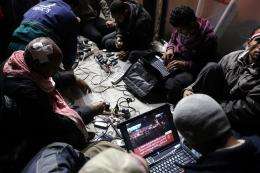Pentagon looks to social media as new battlefield

The Pentagon is asking scientists to figure out how to detect and counter propaganda on social media networks in the aftermath of Arab uprisings driven by Twitter and Facebook.
The US military's high-tech research arm, the Defense Advanced Research Projects Agency (DARPA), has put out a request for experts to look at "a new science of social networks" that would attempt to get ahead of the curve of events unfolding on new media.
The program's goal was to track "purposeful or deceptive messaging and misinformation" in social networks and to pursue "counter messaging of detected adversary influence operations," according to DARPA's request for proposals issued on July 14.
The project echoes concerns among top military officers about the lightning pace of change in the Middle East, where social networks have served as an engine for protest against some longtime US allies.
Some senior officers have spoken privately of the need to better track unrest revealed in social networks and to look for ways to shape outcomes in the Arab world through Twitter, Facebook or YouTube.
"Events of strategic as well as tactical importance to our Armed Forces are increasingly taking place in social media space," the DARPA announcement said.
"We must, therefore, be aware of these events as they are happening and be in a position to defend ourselves within that space against adverse outcomes," it said.
DARPA predicted that social networks would have a groundbreaking effect on warfare.
"Changes to the nature of conflict resulting from the use of social media are likely to be as profound as those resulting from previous communications revolutions," it said.
Under the proposal, researchers would be expected to unearth and classify the "formation, development and spread of ideas and concepts (memes)" in social media.
The document cited a case in which authorities employed social media to head off a potential crisis, but did not specify details of the incident.
"For example, in one case rumors about the location of a certain individual began to spread in social media space and calls for storming the rumored location reached a fever pitch," it said.
"By chance, responsible authorities were monitoring the social media, detected the crisis building, sent out effective messaging to dispel the rumors and averted a physical attack on the rumored location."
DARPA planned to spend $42 million on the Social Media in Strategic Communication (SMISC) program, with prospective contractors asked to test algorithms through "experiments" with social media, it said.
One possible experiment could involve a "closed social media network" of two to five thousand volunteers or an online role playing game with tens of thousands of players.
(c) 2011 AFP


















